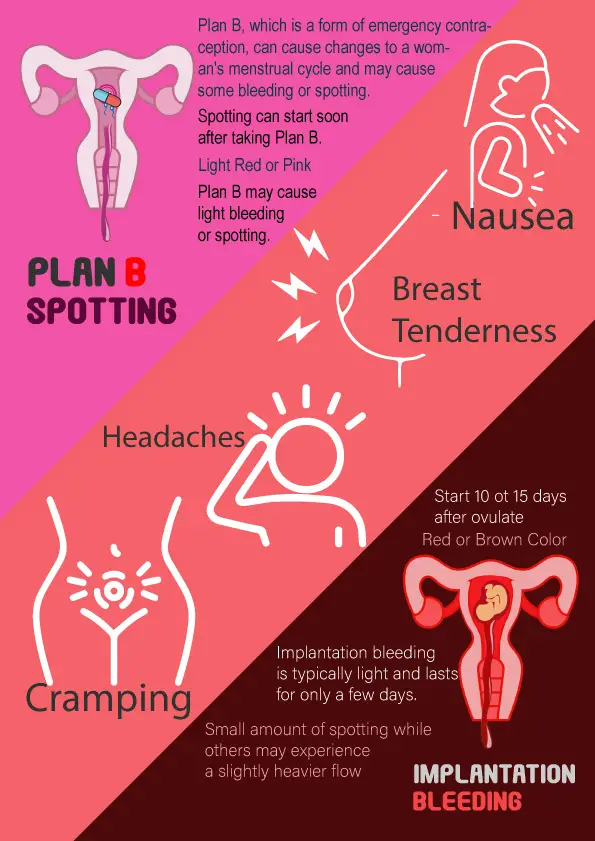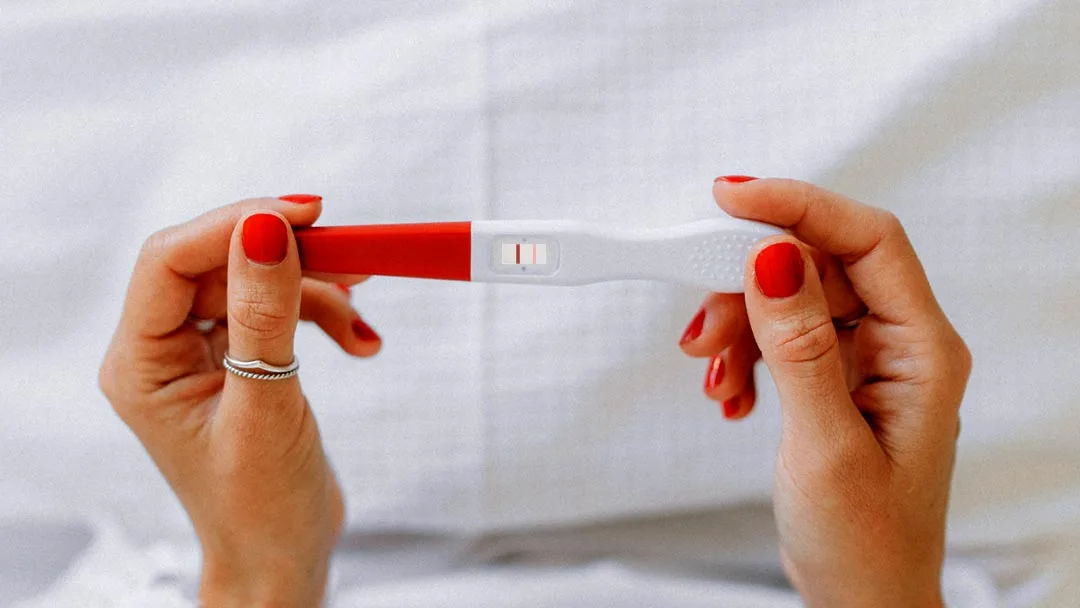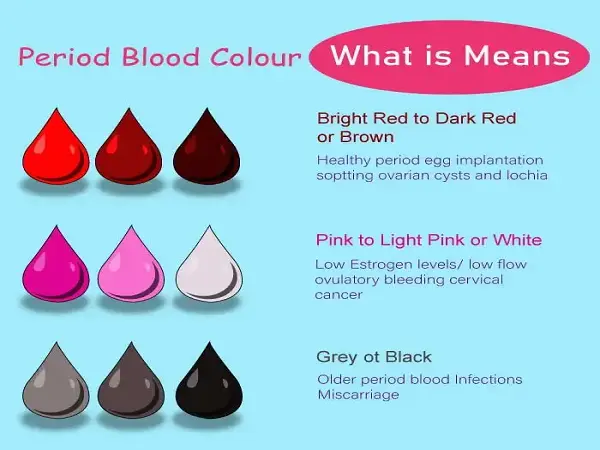Plan B spotting and implantation bleeding are two different types of vaginal bleeding. Plan B spotting occurs after taking the emergency contraceptive pill and typically lasts anywhere from 2-5 days.
Implantation bleeding, on the other hand, is light pink or brownish in color and usually occurs about 10 to 14 days. Here, the timeline is: when a fertilized egg implants itself into the lining of the uterus.
It only lasts for a few hours up to a few days and is much lighter than menstrual flow. The problem is how to define whether it is implantation bleeding with BFP or pregnancy sign or it is not.
To know more about the differences read between the lines of my post below. I believe you will come to know them.
Plan b spotting vs Implantation bleeding?
Plan B spotting and implantation bleeding are two different types of vaginal bleeding that can occur in women, and they have different causes and characteristics. Here are the main differences between the two:

- Timing: Plan B spotting typically occurs within a few days after taking the emergency contraceptive pill, while implantation bleeding timing happens before the next period, which is about 6-12 days after ovulation.
- Duration: Plan B spotting usually lasts for a few days, while implantation bleeding is typically much shorter and may only last for a few hours to a couple of days.
- Amount and color: Plan B bleeding is usually light to moderate in amount and may be pink or brown in color, while implantation bleeding is typically very light and may be pink or brownish-red in color.
- Other symptoms: implantation bleeding is less common than Plan B spotting and is usually a sign of early pregnancy.
Lets discuss the differences below:
What is Plan B spotting?
Spotting is a common side effect of Plan B and refers to light bleeding or spotting that occurs outside of a woman’s regular menstrual period. This can happen due to hormonal changes caused by taking Plan B. By the way, Plan B pills are not considered bad as taking Plan B is FDA approved contraceptive pill.
What is Implantation bleeding?
Implantation bleeding means a successful pregnancy test where you will find dark line on pregnancy test.

If the bleeding gets heavier or lasts longer than a few days, it’s probably spotting.
Plan b Bleeding color vs implantation bleeding color
There are a lot of women out there who are wondering if they are experiencing implantation bleeding or just some spotting from their period. It can be hard to tell the difference, but there are some key things that you can look for.
First, implantation bleeding is usually much lighter than a normal period and it will last for a shorter amount of time.
Second, the blood will be a different color than your normal period blood. It will often be pink or brown instead of red.
Finally, implantation bleeding is typically accompanied by other symptoms like cramping or bloating, which you wouldn’t normally experience with your period.
Your bleeding may happen anywhere from 6-12 days after conception. The implantation bleeding color looks like pink or brown in color and is much lighter than a normal period.
If you are taking pill for the unprotective sex then you will get to see spotting at morning. The spotting color would be usually brown or red in color.


So, what does plan b spotting look like?
Spotting, on the other hand, can occur for a variety of reasons (including ovulation) and is usually red or dark brown in color.

It’s also heavier than implantation bleeding. So, how can you tell- when you are spotting from plan b or it is an implantation bleeding?
Plan B is a high dose of progesterone, which can cause changes in your period cycle.
In some cases, it can cause heavier bleeding or spotting between periods. If you’re already on birth control, taking Plan B can also make your periods irregular.

The healthy pregnancy with implantation bleeding followed by the last period cycle comes with bright red, dark red or brown color. (look at the picture)
Plan B is a emergency contraceptive pill that can be taken after unprotected sex to help prevent pregnancy.
If you’re not sure, your best bet is to wait it out and see what happens.
Difference on pregnancy test result:
With Plan B pregnancy you won’t find the positive pregnancy test. No matter, you try dye stealer pregnancy test.
However, having implantation bleeding alone without plan B signs may differ in terms of finding T line darker then C line.
Calculate the duration before and after taking Plan B:
However, if it stops after a day or two and doesn’t come back, it was likely implantation bleeding.
Chances of becoming pregnant:
It is not 100% effective, but it can greatly reduce the chances of pregnancy if taken within 72 hours of unprotected sex. The sooner it is taken, the more effective it is.
On the other hand, implantation bleeding is the early sign of pregnancy line progression.
4. Relation with Period
If you’re bleeding a week after taking Plan B, it’s most likely your period.
Plan B is a progestin-only emergency contraceptive pill (ECP) that can delay or interrupt ovulation.
It doesn’t affect implantation, so if your ovulation has already started after implantation when you took Plan B, it won’t terminate the pregnancy.
Periods can be irregular after taking Plan B, so it’s not uncommon to bleed a few days to a week later than usual.
That means, Plan B will make the implantation bleeding longer then usual
How do I control Plan B bleeding?
- Apply pressure to the bleeding area with a clean cloth.
- If the bleeding is heavy, elevate the affected area above the level of the heart.
- Apply a cold compress to the area to help reduce swelling .
- Finally, see a doctor if the bleeding does not stop after 15 minutes or if you are concerned about any other symptoms you may be experiencing.
Can Plan B pills cause discharge?
it is important to understand what discharge is and what causes it. Vaginal discharge is a natural occurrence in women and is the body’s way of cleaning and lubricating the va*gina.
The amount and consistency of discharge can vary depending on a woman’s menstrual cycle, age, and other factors such as sexual activity and hormonal changes.

A study published in the journal Contraception investigated the side effects of levonorgestrel emergency contraception pills, including Plan B, in a sample of 254 women.
The researchers found that vaginal discharge was reported by 12.5% of women who took levonorgestrel, compared to 9.2% of women in the control group who did not take the pill.
However, the difference between the two groups was not statistically significant, indicating that there is no strong evidence to suggest that Plan B causes discharge.
Implantation Bleeding after plan B
There are a few reasons why you might bleed more than normal after taking Plan B.
It’s important to remember that Plan B is 89% effective.
PubMed had done 33 studies on Plan B to find whether it end in miscarriage or not. They said:
We found no evidence of increased miscarriage or teratogenicity (3 studies) or disrupted menstrual cycle (3 studies) after Levonorgestrel EC exposure compared to controls
Endler M, Li R, Gemzell Danielsson K. Effect of levonorgestrel emergency contraception on implantation and fertility: A review. Contraception. 2022 May;109:8-18. doi: 10.1016/j.contraception.2022.01.006. Epub 2022 Jan 23. PMID: 35081389.
In another research of Pubmed they said: reactions identified, such as miscarriage, febrile neutropenia, and porphyria, are not included in the Summary of Product Characteristics
It’s also important to remember that Plan B will not protect you from sexually transmitted infections (STIs). So if you think you may have been exposed to an STI, be sure to get tested and treated as soon as possible.
Implantation Bleeding 5 Days After Plan B
Bleeding 5 days after taking the morning after pill is not uncommon and there are several reasons why it could be happening.
The reason for bleeding 5 days post-pill is due to the hormones contained in the medication which can cause changes in your usual menstrual cycle.
It is important to note that this type of bleeding should not last more than 7 days, so if your bleeding persists beyond that timeline you should seek medical advice.
Additionally, it’s possible that you have experienced a hormonal imbalance or an allergic reaction which could also trigger irregular menstrual cycles or spotting.
Lastly, some users report breakthrough bleeding when their period would normally occur despite taking the morning after pill as expected – this kind of spotting usually resolves itself within a few days without further intervention.
However, if you are still experiencing heavy implantation bleeding five days later, then you should contact your doctor for further advice.
They may recommend that you take another form of contraception for a few months until the effects of Plan B would be no more.
Implantation Bleeding a Week After Plan B is That My Period
If you’re bleeding a week after taking Plan B, it’s most likely your period. Plan B is a progestin-only emergency contraceptive pill (ECP) that can delay or interrupt ovulation.
14.7% women experience bleeding between period and implantation bleeding after using Plan B pills.
Gainer E, Kenfack B, Mboudou E, Doh AS, Bouyer J. Menstrual bleeding patterns following levonorgestrel emergency contraception. Contraception. 2006 Aug;74(2):118-24. doi: 10.1016/j.contraception.2006.02.009. Epub 2006 Apr 27. PMID: 16860049; PMCID: PMC1934349.
It doesn’t affect implantation, so if you were already pregnant when you took Plan B, it won’t terminate the pregnancy.
Periods can be irregular after taking Plan B, so it’s not uncommon to bleed a few days to a week later than usual.
Is Spotting 5 Days to 6 days After Plan B Normal?
Yes it is pretty normal to see 6dpo spotting after plan taking plan B pills because implantation bleeding may not last for normally more then 3 to 4 days but Plan B does.
However, there would be many more reasons except taking the pills.
If you’re experiencing brown spotting after taking Plan B, it’s usually nothing to worry about. Brown spotting is a common side effect of the emergency contraceptive and typically lasts for one to two days.
In rare cases, brown spotting can be a sign of an ectopic pregnancy.
When Does Spotting Happen After Plan B?
Spotting may occur anywhere from a few hours to a few days after taking the morning-after pill. The spotting is usually light and should not last for more than a couple of days.
If you experience heavy bleeding or your period does not return to normal within a few weeks, it is advisable to see your doctor.
How Many Days After Plan B Do You Bleed?
It is important to note that the effects of Plan B can vary from person to person. Generally speaking, it is normal to experience bleeding within a few days after taking Plan B. Bleeding may start as soon as 24 hours after taking the medication and can last up to 5-7 days. However, some people may not experience any bleeding at all or they could have light spotting for several weeks after taking Plan B. It is also important to note that if you take more than one dose of Plan B within 120 hours (5 days) of unprotected sex, you should expect heavier and longer lasting bleeding due to the increased hormone dosage in your system.
Does Any Bleeding After Plan B Mean It Worked?
No, bleeding after using Plan B is not an indication that it worked. After taking Plan B, it is normal to experience vaginal bleeding or spotting in the days that follow. This can occur due to the hormone levels changing and does not necessarily mean that the medication was successful.
How Soon After Taking Plan B Do You Bleed
Plan B is an emergency contraceptive which can be taken up to three days after unprotected sex. It works by preventing or delaying ovulation and fertilization, but it does not stop a pregnancy that has already begun. After taking Plan B, many women will experience bleeding similar to a period, usually within 2-7 days afterwards.
Is Bleeding After Plan B Mean You were Pregnant?
No, bleeding after taking Plan B does not mean that you were pregnant. It is normal to experience spotting or light bleeding shortly after taking the emergency contraceptive pill (ECP). This side effect usually occurs within 24 hours of taking the ECP and should resolve itself in a few days.
If your bleeding persists for longer than a few days, it is important to consult with a doctor to rule out any other underlying medical conditions.
Conclusion
There are a lot of women out there who are wondering if they are experiencing implantation bleeding or just some spotting from their period. It can be hard to tell the difference, but there are some key things that you can look for. First, implantation bleeding is usually much lighter than a normal period and it will last for a shorter amount of time.
Second, the blood will be a different color than your normal period blood. It will often be pink or brown instead of red. Finally, implantation bleeding is typically accompanied by other symptoms like cramping or bloating, which you wouldn’t normally experience with your period.
If you’re unsure whether or not you’re experiencing implantation bleeding, it’s always best to talk to your doctor.
References:
Brache, V., Cochon, L., Jesam, C., Maldonado, R., Salvatierra, A. M., Levy, D. P., & Gainer, E. (2002). Immediate preovulatory administration of 30 mg ulipristal acetate significantly delays follicular rupture. Contraception, 66(2), 99-105. doi:10.1016/s0010-7824(02)00358-5
Kapp, N., Abitbol, J. L., Mathe, H., Scherrer, B., Guillard, H., Gainer, E., & Levy, D. P. (2013). Effectiveness of levonorgestrel emergency contraception given before or after ovulation–a pilot study. Contraception, 87(4), 480-486. doi:10.1016/j.contraception.2012.09.008
Shurie S, Were E, Orang’o O, Keter A. Levonorgestrel only emergency contraceptive use and risk of ectopic pregnancy in Eldoret Kenya: a case-control study. Pan Afr Med J. 2018 Nov 29;31:214. doi: 10.11604/pamj.2018.31.214.17484. PMID: 31447973; PMCID: PMC6691316.
Shaaban OM, Abbas AM, Mahmoud HR, Yones EM, Mahmoud A, Zakherah MS. Levonorgestrel emergency contraceptive pills use during breastfeeding; effect on infants’ health and development. J Matern Fetal Neonatal Med. 2019 Aug;32(15):2524-2528. doi: 10.1080/14767058.2018.1439470. Epub 2018 Feb 20. PMID: 29463142.
